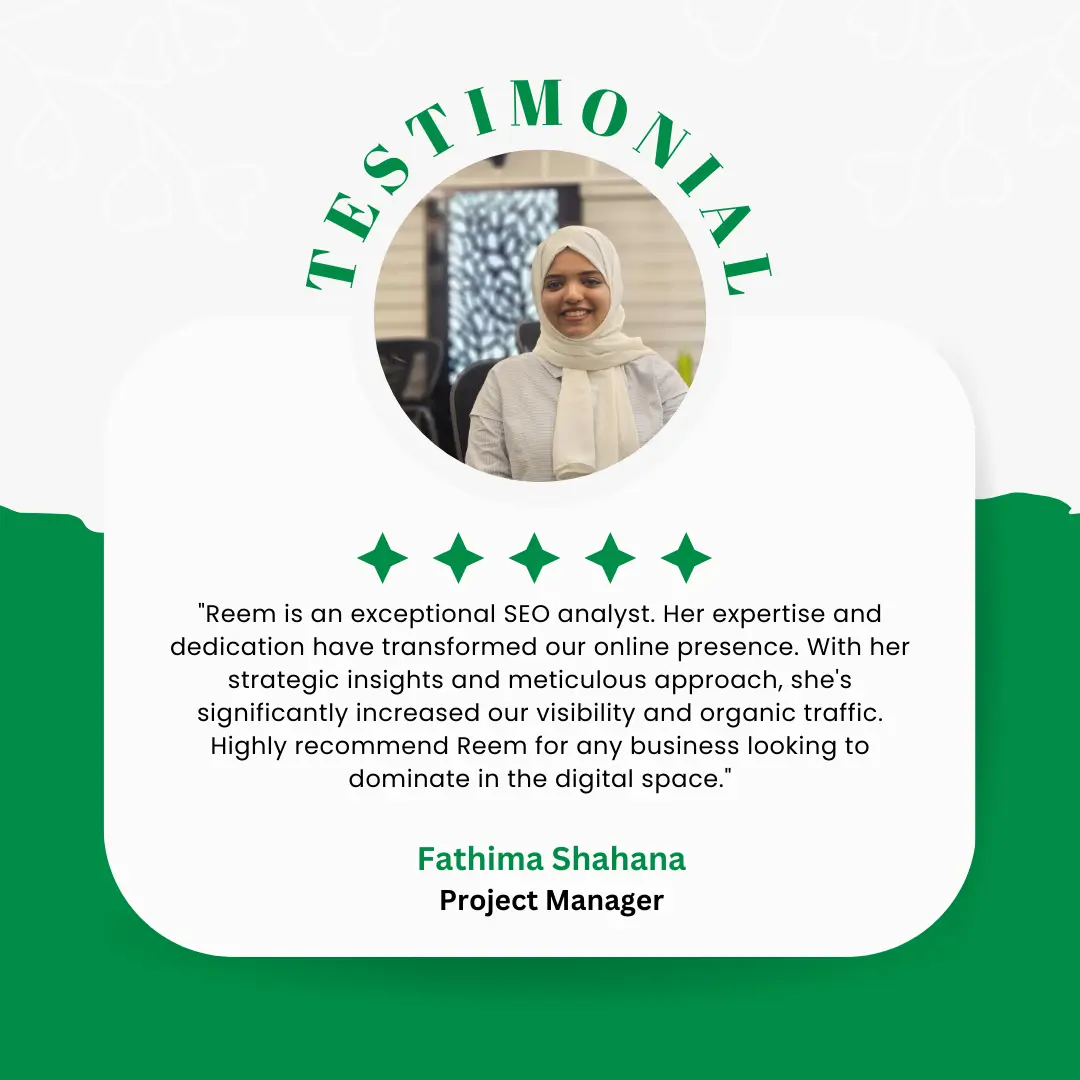Optimise your websites with the trendsetting SEO Expert In Kerala
Is your business struggling to get noticed online? It’s time to rise above the competition and conquer search engine rankings!
Take action now and make your website rank first! Contact us today to learn more about our SEO services and start reaping the benefits of improved online visibility.


ABOUT ME
Know how i became the SEO EXPERT IN KERALA
With a BSc in Computer Science and a rich background spanning three dynamic years in IT, my interest started changing towards the trending course – digital marketing and I understood my niche right away. With my experience in research and analysis , I knew I would become the trendsetting seo expert in kerala .My expertise provides new insights . Fueled by a passion for innovation and a commitment to driving tangible results, I thrive on empowering businesses to excel in the ever-evolving digital landscape. Let’s collaborate to enhance your brand’s online presence and achieve your objectives together.

SERVICES
WHAT CAN I DO?

Keyword Research
Keyword research SEO services provide a comprehensive approach to identifying and leveraging the most effective keywords for a business’s online strategy. These services include analyzing market trends and customer search behavior to uncover relevant keywords that potential customers use. This involves using advanced tools to find high-volume, low-competition keywords, as well as long-tail keywords that target specific user intents.

Local SEO
Local SEO in business significantly boosts online visibility, attracting highly targeted traffic from nearby potential customers. This strategic approach ensures that the business appears prominently in local search results and Google Maps, leading to increased foot traffic and higher conversion rates. It is cost-effective compared to traditional advertising, providing a high return on investment by targeting customers with high purchase intent.

Technical SEO
Technical SEO services encompass a range of optimization techniques aimed at improving a website’s backend structure and performance to enhance its search engine visibility. These services include website audits to identify and fix issues related to site speed, mobile-friendliness, and crawlability. Technical SEO also involves optimizing the website’s architecture, such as URL structure, XML sitemaps, and internal linking, to ensure efficient indexing by search engines

On-page Optimization
On-page optimization services focus on enhancing individual web pages to improve their search engine rankings and attract more relevant traffic. These services include conducting comprehensive keyword research to identify the best keywords and phrases to target. They also involve optimizing meta tags, such as title tags, meta descriptions, and header tags, to ensure they are relevant, compelling, and aligned with targeted keywords.

Link Building
Link building SEO services involve the strategic acquisition of links from external websites to improve a site’s authority, search engine rankings, and organic traffic. These services begin with identifying relevant and authoritative websites within the industry or niche that can potentially link back to the your website.

SEO Reporting & Tracking
Monitoring and analyzing various metrics to assess the performance and effectiveness of SEO strategies. These services include regular reporting on key performance indicators (KPIs) such as organic traffic, keyword rankings, backlink profile, and conversion rates. SEO professionals use tools like Google Analytics, Google Search Console, and third-party SEO software to gather data and insights.
THE SEO PROCESS
1. Keyword and competitor analysis in SEO
Keyword
The process of researching the perfect keyword to rank your website first involves identifying terms with high domain authority (DA) and low keyword difficulty. This ensures that the keywords you choose are not only powerful but also easier to rank for. Additionally, it is crucial that the keywords are relevant to your business, aligning with your content and target audience. By carefully selecting these keywords, you can significantly enhance your website’s visibility and drive more targeted traffic.
Competitor analysis
The process of researching competitors involves gathering insights into their keyword usage, content strategy, and backlink profile. By analyzing their top-performing keywords, we can identify opportunities and gaps in your own keyword strategy. Examining their content can reveal the types of topics and formats that engage their audience, providing inspiration for your own content creation. Additionally, studying their backlink strategy helps understand where their authoritative links are coming from, allowing you to target similar sources. Using these insights to refine your SEO strategy can significantly enhance your website’s performance, driving higher rankings and more targeted traffic.
2. SEO on-page optimization
To increase your website’s exposure and rating in search engine results, on-page optimization is a crucial stage. The key elements are:
Keyword Research and Optimization
Finding pertinent keywords and organically incorporating them into headers, titles, and meta descriptions of your content.
Meta Tags:
Creating precise and eye-catching meta descriptions and titles that include your desired keywords and promote click-throughs.
Material Quality
Producing relevant, high-quality material that speaks to the needs and interests of your audience while incorporating keywords in an organic and significant manner.
Use header tags
Use header tags (H1, H2, H3, etc.) to organize your material so that readers and search engines may more easily comprehend the primary subjects and subtopics.
URL Structure
To enhance user experience and search engine exposure, make sure URLs are clear, descriptive, and contain pertinent keywords.
Internal Linking
Including links to pertinent pages on your website to aid search engines in deciphering the organization of your website and apportioning page authority.
Image Optimization:
To increase accessibility and assist search engines comprehend the information of your photos, use alt text and descriptive file names for your photographs.
Mobile Friendliness
Making sure your website is user-friendly and responsive across all platforms, as this is a crucial component that affects search engine rankings.
Page Speed
Reducing the amount of CSS, JavaScript, and HTML on the page, using browser caching, and compressing pictures to improve page load speeds.
User Experience (UX)
Improving your website’s general usability, which includes aesthetically pleasing design, easy-to-use navigation, and obvious calls-to-action.
Structured Data
Use schema markup to give search engines more details about your material so that rich snippets can improve search results.
3. Technical SEO
Technical SEO entails enhancing your website’s technical elements to boost its functionality, usability, and search engine crawlability. These are the essential elements:
Website Crawling and Indexing
Making sure search engines can efficiently crawl and index your website by utilizing robots.txt to direct search engine crawlers, building an XML sitemap, and submitting it to search engines.
Site architecture
It is the process of structuring your website such that the material flows logically and makes it easier for search engines and users to browse your website.
URL structure
Crafting clear, concise URLs that are easy to read for both users and search engines, and that contain pertinent keywords.
Page speed optimization
It is the process of reducing the amount of CSS, JavaScript, and HTML files on a page, employing a content delivery network (CDN), and using browser caching to speed up page loads.
Mobile optimization
Mobile optimization is important for search engine results. It involves making sure your website is responsive and offers a consistent user experience across all devices.
Secure Sockets Layer (SSL)
Using SSL certificates to encrypt your website with HTTPS helps safeguard user information and influences search engine rankings.
Structured Data Markup
Rich snippets can be used to improve search results by using structured data markup, which gives search engines more information about your material.
Canonical Tags
By telling search engines which version of a page is favored, canonical tags help avoid duplicate content problems.
404 Error Pages and Redirects
301 redirects are used to route visitors and search engines to the correct pages when URLs change, and bespoke 404 error pages are created to enhance user experience.
Breadcrumb Navigation
Using breadcrumb navigation will improve your site’s structure and make it easier for search engines to crawl and for users to comprehend where they are on your website.
XML Sitemap
Keeping your XML sitemap up to date with all the pertinent pages on your website can aid search engines in effectively finding and indexing your material.
Log File Analysis
Examining server log files to learn how search engines visit your website, spot any problems with crawling, and make the required corrections.
Website security
It is the process of guarding against viruses and hacking attempts that could harm user experience and search engine rankings.
4. Content creation and Link building in SEO
Content creation
Keyword Research : Doing some keyword research to find the terms and phrases that people in your target market are using. When looking for keywords with a large search volume and little competition.
Content Strategy: Creating a plan for your content that speaks to the needs and interests of your audience while also being in line with your keywords. A variety of content kinds, including blog entries, essays, videos, infographics, and more, would be planned.
High-quality Content: Producing insightful, engrossing, and thoroughly researched content that benefits your readers. Making sure it is unique and does not contain any keyword stuffing when optimizing for your target keywords. To improve readability, use bullet points, subheadings, and headings.
Content Length and Format: Selecting the right format for each piece of content and make sure it satisfies your audience’s requirements.
Content Updating and Refreshing: To maintain your content current and accurate, updating it on a regular basis. Since search engines prefer new material, upgrading older postings will help to improve ranking.
Link building
Determine Possibilities for Link Building: Locating possible websites that might reciprocate links to your content.
Provide information That Is Worth Sharing: Providing insightful, useful, and readable information. These could be in-depth manuals, unique studies, infographics, or interesting blog entries.
Outreach Strategy: Informing website owners, bloggers, and industry influencers about your content by getting in touch with them. To improve your chances of obtaining backlinks, sending them tailored emails outlining the importance of your content and how their audience can benefit from it.
Guest blogging: Writing guest posts for respectable websites in your niche is known as guest blogging. Asking a hyperlink back to your website in return for your material. Making sure the guest post is excellent and pertinent to the website of the host.
Broken Link Building: Looking for links that are broken on other websites, then offer your material to take their place. This gives you a backlink and assists the owner of the website in fixing any broken links.
Engage in Industry Forums and Communities: Taking part in conversations on social media groups, Q&A websites such as Quora, and industry-specific forums. When appropriate, share your content, but refrain from spamming.
Use Social Media: To improve your content’s exposure and chances of obtaining natural backlinks, promote it on social media sites.
Track and Examine Backlinks: Making sure your backlinks come from reliable sources by using tools to keep track of them. Disallowing any links that are dangerous or could hurt your SEO.
5. Ongoing monitoring and analysis in SEO
Performance tracking
Google Analytics: Tracking user activity, traffic, and conversions on your website with Google Analytics. Tracking data like page views, bounce rate, length of session, and conversion rates.
Google Search Console: Monitoring the impressions, clicks, average position, and click-through rate (CTR) of your website in search results.
Keyword Rankings
Tools for Tracking Rank: Utilize tools such as Ahrefs, SEMrush, or Moz to track the ranks of your keywords. Keeping an eye on the performance of your target keywords over time and note any notable changes.
Analysis of Competitors: Examining your competitors’ keyword rankings on a regular basis to spot emerging trends and potential dangers.
Backlink Analysis
Backlink Monitoring Tools: Tracking your backlinks with Ahrefs, Moz, or SEMrush, among other tools. Keeping an eye on the quantity and quality of your backlinks, and note any missing or newly created links.
Disallow Spammy and damaging Links: Taking notes of and remove any spammy or damaging backlinks that might be hurting your SEO.
Content Performance
Engagement data: Finding out how effectively your content is connecting with your audience, examining engagement data like average time on page, social shares, and comments.
Content Updates: Maintaining relevance and boost performance, update and refresh your content frequently. Determining which material is underperforming and improve it for improved outcomes.
Technical SEO Audits
Site audits: Using tools like Screaming Frog, Ahrefs, or SEMrush to do routine technical SEO audits on your website in order to find and address problems like crawl errors, broken links, and duplicate content.
Page performance: Using tools like Google PageSpeed Insights or GTmetrix to track and optimize the performance of the pages on your website. To improve load times, reduce code, taking advantage of browser caching, and optimize graphics.
Mobile Optimization:
Mobile Usability: Using Google’s Mobile-Friendly test to make sure your website is optimized for mobile devices. To give mobile consumers a flawless experience, keep an eye out for usability concerns and address any that arise.
Responsive design: Testing and refining your website’s responsive design on a regular basis to make sure it functions properly across all platforms.
User Experience (UX) Analysis
Heatmaps and User activity: Examining heatmaps and user activity on your website, utilize programs like Crazy Egg or Hotjar. Determining the locations where people are interacting or running into problems.
A/B testing: Examining several iterations of your webpages to ascertain which components enhance user experience and conversion rates.
Reporting and Insights
Regular Reports: Monitoring development, spot patterns, and pinpoint areas in need of improvement, prepare periodical reports on SEO performance. In order to keep stakeholders informed, distribute these reports to them.
Data-Driven Decisions: Making data-driven choices by utilizing the knowledge you’ve gathered from your analysis and monitoring. Continue to hone your SEO approach in light of the outcomes.
BLOGS
HERE ARE MY LATEST INSIGHTS
ORGANIC RESULT VS PAID RESULT
Organic Result The listing that shows up on the search engine result page (SERP) for a certain query is known as an organic search result. Organic search is one of the best ways to increase traffic or conversions because it is free and visitors can see that you are...
WHAT IS KEYWORD IN SEO ?
Keyword research is the process of researching popular search phrases that people use in search engines like Google and properly adding them to your content so that it ranks better on search engine results pages. This is essential because it can provide important...
SEO BASICS FOR BEGINNERS
Dive into my essential guide on SEO basics for beginners and take the first step to mastering search engine optimization! SEO stands for Search Engine Optimization. It refers to the practice of improving a website's visibility on search engines like Google, Bing, and...
WHY DIGITAL MARKETING IS MUST FOR BUSINESSES
Are you confused about using digital marketing over traditional marketing? In today’s digital era, users have fallen into digital platforms. So, it’s essential for business success rather than just being a bonus element. Digital marketing is a cost-effective way to...
TESTIMONIALS






FREQUENTLY ASKED QUESTIONS (FAQ)
What is SEO?
SEO stands for Search Engine Optimization. It refers to the practice of improving a website’s visibility on search engines like Google, Bing, and Yahoo etc. This involves optimizing the site and its content to make it more attractive to these search engines, with the goal of ranking higher in search engine results pages (SERPs).
SEO can be defined as a set of strategies that brands use to make their content more visible in the top 10 search results on the search engines. As visitors who are potential customers have a tendency to navigate through top results brands put all their SEO effort into landing in top result
Are SEO experts in demand?
Yes, SEO experts are in high demand. As businesses continue to recognize the importance of online presence and digital marketing, the need for skilled SEO professionals has increased. Here are some reasons why SEO experts are in demand:
- Increased Online Competition: More businesses are establishing an online presence, leading to increased competition for search engine rankings.
- E-commerce Growth: The rise of e-commerce has made SEO crucial for online retailers to attract and retain customers.
- Content Marketing: Effective SEO is essential for content marketing strategies to ensure that content is discoverable by search engines and reaches the target audience.
- Local SEO: As local searches become more common, businesses need experts to optimize their presence for local search results.
- Mobile Optimization: With the growing use of mobile devices, SEO experts are needed to optimize websites for mobile search.
- Algorithm Changes: Search engines frequently update their algorithms, requiring SEO professionals to stay current and adapt strategies accordingly.
- User Experience (UX): SEO and UX are increasingly interconnected, with search engines favoring websites that provide a good user experience.
- Data-Driven Marketing: SEO experts use data and analytics to inform strategies, making them valuable for businesses looking to make data-driven decisions.
- Cost-Effectiveness: SEO is often more cost-effective than other forms of digital marketing, making it an attractive option for businesses with limited marketing budgets.
Is SEO expert a good career?
Yes, a career in SEO (Search Engine Optimization) is a great choice. It offers opportunities for growth and development in the digital marketing field, providing skills in search engine functionality, website optimization, and content marketing strategies. As businesses increasingly prioritize their online presence, the demand for SEO professionals continues to rise.
How do i choose an SEO expert in kerala?
Choosing an SEO expert in Kerala involves several steps to ensure you find someone who is experienced, trustworthy, and capable of delivering results. Here are some tips to help you make the right choice:
1. Research and Referrals:
Ask for recommendations from colleagues, business partners, or industry contacts.
Search online for SEO experts or agencies in Kerala and read reviews.
2. Check Their Portfolio:
Look at their past work and case studies to see the results they have achieved for other clients.
Ask for references from previous clients to get first-hand feedback on their services.
3. Evaluate Their Website:
Analyze their own website’s SEO performance. An SEO expert should have a well-optimized website that ranks well in search engines.
4. Understand Their SEO Strategy:
Ask about their approach to SEO, including on-page and off-page optimization, content strategy, and link building.
Ensure they follow ethical SEO practices (white-hat techniques) and avoid shortcuts that could result in penalties.
5. Check Their Knowledge:
Discuss current SEO trends and algorithm updates to gauge their expertise and knowledge of the industry.
Ask technical questions to assess their understanding of SEO principles.
6. Communication Skills:
Evaluate their communication style to ensure they can explain complex concepts in a way that you understand.
Ensure they are responsive and proactive in their communication.
7. Pricing and Contracts:
Compare pricing from different experts or agencies and understand what services are included.
Read the contract carefully to understand the terms, including the scope of work, timelines, and payment terms.
8. Tools and Reporting:
Ask about the tools they use for SEO analysis, keyword research, and tracking performance.
Ensure they provide regular reports that clearly show progress and results.
9. Local Knowledge:
Prefer experts with local knowledge who understand the market dynamics in Kerala and can optimize for local search terms.
10. Trial Period:
Consider a trial period to assess their performance before committing to a long-term contract.
What are the skills of SEO expert in kerala?
An SEO expert should possess a combination of technical, analytical, and creative skills to effectively optimize websites and improve their search engine rankings. Here are some key skills an SEO expert should have:
1. Technical SEO Skills:
Understanding of HTML/CSS: Basic knowledge to optimize and troubleshoot on-page elements.
Website Architecture: Knowledge of how to structure a website for optimal crawling and indexing by search engines.
Technical Auditing: Ability to conduct thorough SEO audits to identify and fix technical issues.
Mobile Optimization: Ensuring websites are mobile-friendly and optimized for mobile search.
2. Keyword Research:
Keyword Analysis: Proficiency in using tools like Google Keyword Planner, Ahrefs, and SEMrush to find relevant keywords.
Competitor Analysis: Ability to analyze competitor keywords and strategies.
3. On-Page SEO:
Content Optimization: Skills in optimizing content with keywords, meta tags, headings, and internal links.
Content Creation: Ability to create high-quality, engaging, and SEO-friendly content.
User Experience (UX) : Understanding the importance of UX in SEO and how to improve it.
4. Off-Page SEO:
Link Building: Knowledge of strategies for acquiring high-quality backlinks.
Social Media Integration: Understanding the role of social media in SEO and how to leverage it for better rankings.
5. Analytical Skills:
Data Analysis: Proficiency in using Google Analytics, Google Search Console, and other analytics tools to track and analyze website performance.
Reporting: Ability to create clear and comprehensive reports to communicate SEO progress and results.
6. Soft Skills:
Communication: Strong verbal and written communication skills to explain SEO concepts and strategies to clients or team members.
Problem-Solving: Ability to identify and solve SEO-related issues.
Project Management: Skills in managing SEO projects, including planning, execution, and monitoring.
7. Knowledge of SEO Tools:
Familiarity with various SEO tools such as Moz, Ahrefs, SEMrush, Screaming Frog, and others for different aspects of SEO work.
8. Staying Updated:
Continuous Learning: Keeping up with the latest SEO trends, algorithm updates, and best practices.
Adaptability: Ability to adapt strategies based on changes in search engine algorithms and industry trends.
9. Local SEO:
Local Search Optimization: Skills in optimizing for local search queries, managing Google My Business profiles, and local citations.
10. Marketing and Content Strategy:
Content Marketing: Understanding how content marketing integrates with SEO.
Conversion Rate Optimization (CRO): Skills in improving website elements to increase conversions.
These skills enable an SEO expert to develop and execute effective SEO strategies that drive organic traffic and improve search engine rankings.
Does seo expert in kerala have a future?
Yes, SEO experts have a promising future. As the digital landscape continues to grow and evolve, the demand for skilled SEO professionals is expected to remain strong. Here are some reasons why SEO experts will continue to have a future:
1. Increasing Online Presence: More businesses are recognizing the importance of having an online presence, leading to greater investment in SEO to improve visibility and reach.
2. E-commerce Growth: The rapid growth of e-commerce means businesses need to optimize their online stores to attract and retain customers, creating a sustained demand for SEO expertise.
3. Search Engine Algorithm Changes: Search engines frequently update their algorithms, requiring ongoing SEO efforts and expertise to adapt and maintain rankings.
4. Content Marketing: Quality content is crucial for SEO, and as content marketing continues to be a key strategy for businesses, the need for SEO experts to optimize content will remain strong.
5. Local SEO: With the increasing importance of local searches, businesses will continue to need SEO experts to optimize their local search presence.
6. Mobile and Voice Search: The rise of mobile and voice search requires specialized SEO strategies, ensuring continued demand for SEO professionals who can adapt to these trends.
7. User Experience (UX) and SEO Integration: Search engines are placing more emphasis on user experience, making it essential for SEO experts to integrate UX improvements into their strategies.
8. Competitive Advantage: Businesses seek a competitive edge, and effective SEO is a key factor in achieving higher search engine rankings and attracting more organic traffic.
9. Data-Driven Decisions: As businesses become more data-driven, SEO experts who can analyze and leverage data to inform their strategies will be highly valued.
10. International SEO: As businesses expand globally, the need for SEO experts who can navigate different languages, cultures, and search behaviors will grow.
11. Emerging Technologies: Technologies like AI, machine learning, and blockchain are impacting SEO, creating opportunities for experts who can leverage these advancements.
12. Freelance and Agency Opportunities: SEO expertise is valuable not only for in-house positions but also for freelance consultants and agencies, providing diverse career paths.
CONTACT ME
LET’S TALK





